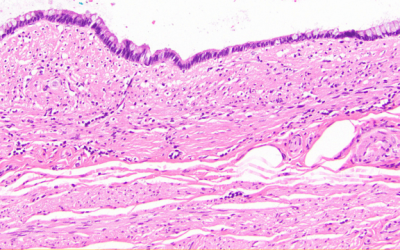There are several factors that can impact the prognosis for pseudomyxoma peritonei (PMP), including:
- The extent and location of the tumour:
The size and location of the tumour can impact the success of surgical treatment and the likelihood of recurrence. Patients with smaller tumours that are confined to the appendix and have not spread to other organs generally have a better prognosis than those with larger tumours or tumours that have spread throughout the peritoneal cavity. - The histological grade of the tumour:
The histological grade of the tumour refers to how abnormal the cells look under a microscope. Tumours that are well-differentiated (low-grade) tend to have a better prognosis than those that are poorly differentiated (high-grade). - Your age and overall health:
Older patients and those with underlying medical conditions may be more susceptible to complications from treatment and may have a poorer prognosis. - The success of surgical and chemotherapy treatments:
The success of cytoreductive surgery and heated intraperitoneal chemotherapy (HIPEC) can impact the patient’s prognosis. If the surgery is successful in removing all visible tumor and HIPEC is effective in killing any remaining cancer cells, the patient may have a better prognosis. - The presence of other medical conditions:
The presence of other medical conditions, such as diabetes or heart disease, can impact the patient’s overall health and may affect their ability to tolerate treatment. - Your response to treatment:
Patients who respond well to treatment and have no evidence of disease after treatment have a better prognosis than those who experience recurrence or progression of the disease.
Overall, the prognosis for PMP can be challenging, and survival rates vary depending on several factors. However, with appropriate treatment and management, patients can achieve improved quality of life and long-term survival.
More frequently asked questions
What is goblet cell adencarcinoma
Goblet cell adenocarcinoma is a rare type of cancer that arises from cells that are normally present in the lining of the appendix.
Is pseudomyxoma peritonei a cancer?
Yes, pseudomyxoma peritonei (PMP) is a rare cancer that usually starts in the appendix and can spread to the peritoneum, which is the lining of the abdominal cavity.
How’s PMP diagnosed?
Pseudomyxoma peritonei is usually found during an unrelated procedure such as during an operation for something else.
References
Prognostic Factors in Pseudomyxoma Peritonei ...
Blaj S, Dora D, Lohinai Z, Herold Z, Szasz AM, Herzberg J, Kodacsi R, Baransi S, Schlitt HJ, Hornung M, Werner JM, Slowik P, Acs M, Piso P. Prognostic Factors in Pseudomyxoma Peritonei with Emphasis on the Predictive Role of Peritoneal Cancer Index and Tumor Markers. Cancers. 2023; 15(4):1326. doi:10.3390/cancers15041326
Survival after complete cytoreductive surgery and HIPEC for extensive Pseudomyxoma peritonei
Benhaim L, Faron M, Gelli M, et al. Survival after complete cytoreductive surgery and HIPEC for extensive Pseudomyxoma peritonei. Surgical Oncology. 2019;29:78-83. doi:10.1016/j.suronc.2019.03.004
Factors influencing long‐term survival after cytoreductive surgery and hyperthermic intraperitoneal chemotherapy for Pseudomyxoma peritonei originating from Appendiceal Neoplasms
van Eden WJ, Kok NF, Snaebjornsson P, et al. Factors influencing long‐term survival after cytoreductive surgery and hyperthermic intraperitoneal chemotherapy for Pseudomyxoma peritonei originating from Appendiceal Neoplasms. BJS Open. 2019;3(3):376-386. doi:10.1002/bjs5.50134



